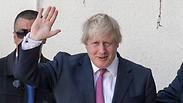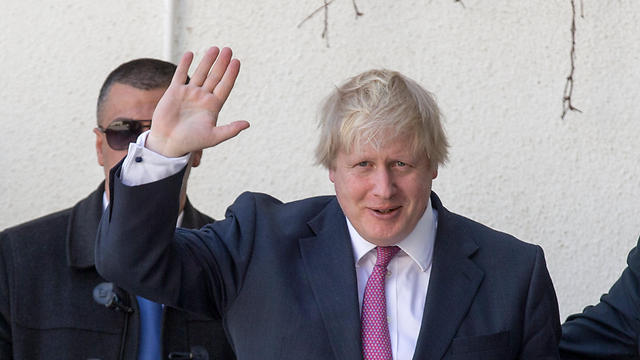
Johnson says Britain still backs 2-state solution in Mideast
Visiting Israel for the first time since being appointed foreign minister by PM Theresa May, Johnson insists his country is a 'rock-like' supporter of Israel, but cites Israeli construction in the West Bank as an obstacle to achieving peace; Netanyahu rebuffs claim that settlements inhibit peace.
Boris Johnson said he believes it's still possible to set up a state of Palestine alongside Israel and that the leadership change in Washington might offer an opportunity.
"There is a willingness to look at things with fresh eyes," Johnson said after meeting with Palestinian Foreign Minister Riad Malki in the city of Ramallah, the base of the Palestinian Authority.
Standing next to Malki on a podium, near a "State of Palestine" seal, Johnson said that "the policy of our government in the UK is absolutely unchanged, we remain committed to a two-state solution, to that vision for the resolution of this conflict."
"I really think it is possible," Johnson said. "We must not abandon that prospect."
Johnson cited challenges to achieving peace, including what he described as "the accelerated pace of settlement building, the accelerated pace of demolitions."
"Those are also the barriers in the path of a two-state solution, and we have to work to remove those barriers," he said.
Speaking to Ynet, Johnson expressed his country’s concern over the Regulation Law. However, he also said that he had received a promise from legal officials in Israel that the law will not be implemented.
The law’s very existence, he said, was cause for concern. “We are extremely concerned about the expansion of settlement building.”
Johnson also emphasized that Britain would not be re-airing President Donald Trump’s recent signals in a meeting with Prime Minister Netanyahu that he was interested in exploring the possibility of one state or two states, depending on what the sides could agree on.
He implored Israel to remain committed to achieving two states, warning that anything else would result consequences that would be detrimental for both sides.
Nevertheless, Johnson stressed that "Israel has, first and foremost, an absolute right to live in security and the people of Israel deserve to be safe from terrorism. That’s our absolute priority and we work with you, as you know, in all kinds of ways to ensure the stability of the entire region"
Johnson met with Netanyahu later on Wednesday, after holding talks with Abbas.
He insisted his government is one of the "firm, strong supporters, rock-like supporters of Israel."
"I should remind you that the policy of our government is for a two-state solution ... Israel has first and foremost and absolute right to live in security and the people of Israel deserve to be safe from terrorism and that's our absolute priority," Johnson said. "We must also try to remove obstacles to peace and progress such as the settlements."
Netanyahu reiterated his position on the conflict.
"I had a wonderful meeting in London, a good meeting with Prime Minister May and with you. I look forward to coming to London for the hundredth anniversary of the Balfour Declaration, and also to celebrate the great partnership between us," Netanyahu began.
"We are enhancing our cooperation in economics, in technology, in security, in cooperation in the field of cyber, in many, many other areas. And we also seek a world that’s secure and peaceful, and I look forward to discussing both of these things with you."
The prime minister went on to say that "the reason we haven't had peace here for a hundred years is not the settlements but the persistent refusal to recognize a nation state for the Jewish people in any boundary. I think if you want to solve the problem you go to the core of the problem."
In an unusual move, Johnson also toured parts of the West Bank with Israel's anti-settlement watchdog group Peace Now.
"We briefed him about the situation and the importance of keeping two-state solution alive," Hagit Ofran of Peace Now said.
In November 2015, while mayor of London, Johnson had led a trade mission to the region, but the West Bank segment unraveled after he criticized a Palestinian-led movement of boycott, divestment and sanctions against Israel. Two of his meetings, with Palestinian youth and female business leaders, were called off at the time in protest over what was perceived as a pro-Israel stance.












